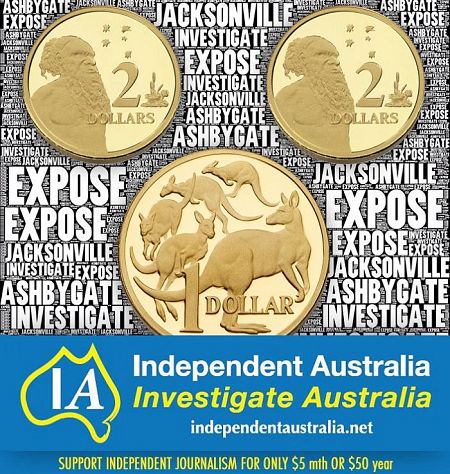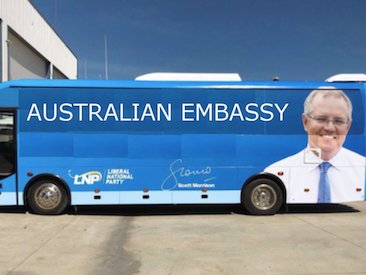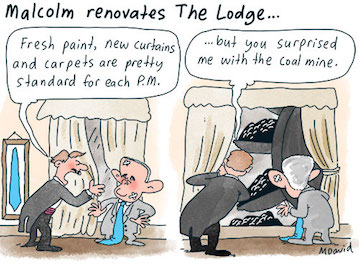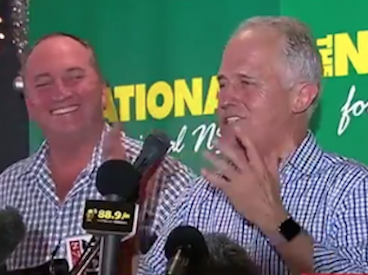The minister and the Centrelink mouthpiece say the system is "working as intended", producing the outputs it is programmed to produce — which is to drive low income people to despair, writes Ingrid Matthews.
LAST THURSDAY, a mate and I had a few quiet drinks and a post-festive season debrief on my back verandah. He grew up in poverty – in cars and refuges, and low-income neighbourhoods, his education disrupted, his parents often absent – to shift work, to incapacity. He holds a university degree, a steady job, and a mortgage with his partner.
Inevitably, we got talking about the Federal Government policy of sending 20,000 letters per week to past or current welfare recipients demanding repayment of past or current or – with an error rate of at least 20 per cent – non-existent debts.
It is difficult to remember when I started earning enough to stop reporting my income to Centrelink, as a sole parent raising three children in western Sydney while working part time and studying law. But I will never forget the process. The dehumanisation; the penalties incurred on utilities bills due to Centrelink errors; the time; the "voice recognition", which could never identify my employer correctly; the stress; the humiliation; the look on my children’s faces as I yelled at the phone; their avoidance behaviours around excursions and other expenses; the cost, the cost, the financial and emotional and personal and family cost.
Being poor is hugely and unnecessarily expensive and it does not have to be like this.
Our Government has gone out of its way to make what is already a horrible and inefficient and expensive process much worse than when I reported fortnightly, first on paper and in person, and later by telephone to a machine. It is horrendous for income support recipients, for Centrelink staff and for the budget bottom line.
According to 'Appendix E – Data matching' of the 2015-16 Annual Report, the Department of Human Services spent $19.5 million in 2013-14, $25.5 million in 2014-15 and $8.3 million last financial year on its data matching program. That is, our government has allocated over $50 million in the last three years to produce the outcomes reported in the first week of 2017; outcomes so appalling a government agency is making blanket referrals to the suicide prevention service Lifeline for hardships caused by its own actions.
Let that sink in: Centrelink is using social media platform Twitter to refer income support recipients to Lifeline, because some "customers" are suicidal after receiving letters sent by the agency demanding repayment of debts that these people have not, in fact, incurred. This is the "return" on a $50 million investment of public moneys.
Many were letters stamped with the Australian Federal Police logo, demanding information under the code name 'Operation Integrity'.
It will surprise no one who has observed the Turnbull Government that the operation has no integrity. The link above does not provide a breakdown of Operation Integrity costs.
But it offers this:
'From 1 July 2016, $45.1 million will be invested in the myGov digital service over 4 years, to ensure people can continue to interact with the Australian Government online, ensuring access by all tiers of government.… the next phase of improvements to myGov. $5.4 million will be invested over 2 years to modernise this service and ensure it continues to deliver on the government’s commitment to make services simpler, clearer and faster.'
From what I can tell – and I may not be reading it correctly (the reporting methods are oblique at best) – this amounts to an additional $50 million for a total of $100 million for the years 2013-20. Again, to use the Government-preferred econospeak, this "investment" has a return. In the first week of 2017, the dividend included driving some low-income Australians to suicidal despair. And causing incalculable hardship to other welfare recipients across the country.
Mr Tudge said Centrelink's systems
were working "as intended"
To put that figure in perspective, the politician expenditure for the first half of 2015 – this is above and beyond their $200-500K+ salaries, and does not include the cost of their staffers – was $48 million. That is for six months, so a reasonable guesstimate is that yearly expenditure would be around $100 million. More recent figures do not include total costs.
Welfare recipients have 21 days to respond to a threatening letter, but political expenditure disclosure is delayed by at least six months, as are political donations reporting requirements. For example, next month we apparently find out whether Turnbull threw in around $2 million to his own re-election campaign — the one where he lost 14 seats and claimed a mandate, including for these kinds of nasty policies.
Remember, Treasurer Scott Morrison told us in the dying days of that dreary campaign that a re-elected Coalition government would continue to hate on the poor while cutting company tax rates (although a tax cut for entities which pay zero tax still generates zero revenue).
So from a government preaching fiscal restraint and sound economic management, we have seen a) $50 million spent over four years (2013-16), with another $50 million slated for the next four, to persecute the poor; and b) $100 million spent in one year (2015) to ship Deputy PM Barnaby Joyce and Minister for Foreign Affairs Julie Bishop and their ilk around the country and the globe. The return on that "investment" by the Australian public – over which we had no say – is
a) Harm to welfare recipients up to and including contemplation of suicide; and
b) Who knows? Contracts to client donors, but if there is a discernible benefit to the nation, I have yet to see it reported.
Independently wealthy politicians, people who have never missed a meal in their lives, are an enormous drain on the public purse. They are born into families that can afford to choose expensive educations which set the kids up for life. They grow up to be blind to their own privilege, yet make decisions which further marginalise and oppress identifiable groups in society, groups to which they have never belonged, and for whom they are utterly unqualified to make decisions.
Turnbull and ministers Porter and Joyce do not understand that the entire point of fiscal policy, of a civil society, of collecting taxes and allocating resources to essential services, is to provide for those who – due to age, disability, parenting responsibilities, labour market conditions, whatever – can not always meet basic human needs such as food, housing and utilities.
And this is in a wealthy society whose shape and values are determined by people such as themselves — by the beneficiaries of inherited wealth. A society which in the 21st century means that ICT and metropolitan transport are necessities – for job-seeking – on top of food and shelter. A dominant culture, which refuses to value reciprocity, mutuality, sharing, love. A government which co-opts these values to spout nasty and abusive rhetoric on mutual obligation and correct entitlement.
A government which pretends that a system which data-matches welfare recipients to Australian Tax Office (ATO) records is somehow acting on behalf of some special category of taxpayer, by persecuting some other category of taxpayer. People who paid taxes and received income support in the same year are the people receiving these letters: they are, by definition, taxpayers. As is anyone who has bought anything other than fresh food since 2001.
But that would be putting facts in the way of this government’s favourite pastime, which is to demonise welfare recipients (when it is not persecuting people fleeing persecution, or trolling women, and migrants, or ignoring Aboriginal rights).
This is a government entirely composed of people whose luxurious taxpayer-funded lifestyle falls outside of welfare categories. Its support base is also made up of people who enjoy private school fee subsidies, the medical advances borne of public teaching hospitals, immediate $20K write-downs on small business costs … but these are not classified as welfare either.
Under this value system, those who want for nothing are worthy of hundreds of millions in public moneys. Yet receiving and spending public moneys on food and shelter (rather than, say, mining truck diesel fuel) is somehow unworthy.
What a way to run a country, which has been skilfully and beautifully managed for upwards of 50,000 years. A place of pristine rivers and verdant soils, of generosity and beauty and bounty, if only those who seized it for themselves could see.
The agency mouthpiece Hank Jongen consistently reiterates that he has "complete confidence" in the system. To date, the prime minister has not commented on the fact that a government agency is systematically driving low-income Australians to despair.
The senior minister for social services, Christian Porter, also insists that the system is "working incredibly well", that it is a gold star system, that no better system could be designed.
The junior minister, Alan Tudge, who was invisible all week while the story broke, finally emerged to echo Porter, Jongen and Joyce. Are we really paying him to reject reports that the system is flawed, as his colleagues did before him?
Said Tudge yesterday to reporters in Canberra:
"The system is working and we will continue with that system... it is working as intended."
The evidence shows that the system is causing enormous harm to the poor. The minister and Centrelink's mouthpiece say the system is working as it is supposed to work, operating as it is designed to operate, producing the outputs it is programmed to produce.
I believe them.
Ingrid Matthews lectures in law at the University of Western Sydney. You can follow Ingrid on Twitter @iMusing or her blog Ecomuse.
Monthly Donation
Single Donation
Fight for fairness. Subscribe to IA for just $5.











